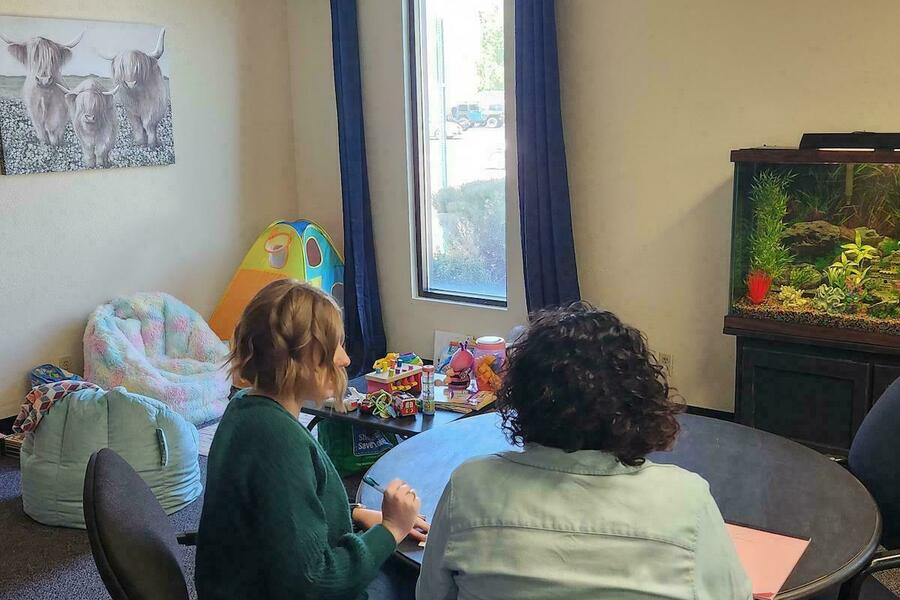Elevating Families

Locations
- Catholic Charities Northern Nevada, Nevada
Focus Area
- Self-Sufficiency
"Breaking the cycle of poverty requires bold, innovative solutions in our community. We believe we've found such a solution in Economic Mobility Mentoring."
The Issue
Poverty often perpetuates from one generation to the next, creating a cycle that is difficult to escape. Children born into poverty are more likely to experience poverty throughout their lives and face obstacles to achieving high earnings in adulthood. The effects of poverty extend beyond economic hardship; it can hinder child development, impair school performance, and strain family relationships, leading to unhealthy dynamics, violence, and excessive stress. Ending generational poverty demands a multi-faceted approach that addresses these complex challenges comprehensively. While the challenges of overcoming poverty are well-documented, there is limited evidence on interventions capable of breaking the generational cycle.
One promising strategy is a comprehensive support program that tackles the multifaceted aspects of poverty. Such programs have shown promise in improving outcomes related to housing, community college completion, and income.
Catholic Charities of Northern Nevada (CCNN) is a nonprofit organization dedicated to supporting families in need in the Diocese of Reno, including through its new Elevating Families program. This program seeks to combat generational poverty by applying the Economic Mobility Pathway (EMPath) Mobility Mentoring model, with a special emphasis on the outcomes of children.
The Intervention
The Elevating Families program will provide a bundle of services designed to end generational poverty by enhancing the economic well-being of families and improving the overall welfare of both parents and children. The program will focus on five key areas: family stability, health and well-being, financial management, education and training, and employment and career development. Participants will collaborate with a Mobility Mentor to craft a Goal Action Plan that addresses these five dimensions, and they will receive incentives for achieving their goals. In addition to mentoring sessions, participants will have access to free childcare services during sessions, and they can attend classes on money management, career development, and parenting skills at an Elevating Families center on CCNN's new family service campus.
Research Question
What is the impact of the Elevating Families program, with a focus on the well-being of both parents and their children, on outcomes for parents (income, employment, financial well-being) and children (educational outcomes and involvement with the child welfare system)?
Intended Outcomes
Parents who participate in the Elevating Families program will have an increase in income, improved employment status and stability, reduction in debt and improvement in credit, and a decreased reliance on public benefits.
Children involved in the Elevating Families program will have improved educational outcomes, including attendance, on-time grade progression, test scores, and graduation rates, reduction in reports of neglect and abuse to Child Protective Services (CPS), and decreased involvement with the foster care system
Research Study Design
LEO intends to employ a randomized controlled trial (RCT) design to assess the impact of participating in the Elevating Families program. Due to capacity constraints, CCNN cannot offer program spots to all eligible families, making randomization the fairest method for selection.
The process begins with CCNN inviting interested families to complete an online screening interest form. During quarterly enrollment periods, CCNN will assess families for eligibility and invite eligible families to participate in in-person small group meetings or phone conversations. At these meetings, participants will provide informed consent for themselves and their children and complete a pre-randomization survey. Participants who complete the survey will receive a $25 gift card. The research team will then randomize these families into treatment and control groups.
Families in the treatment group will be offered a spot in the Elevating Families program, connecting them with their Mobility Mentor and initiating the process of outlining and fulfilling their action plan. Those assigned to the control group will receive information about other services they are already eligible to access.
Should this mentoring program prove effective in improving outcomes for both parents and children, it would serve as a compelling case for replication and wider adoption of the EMPath model in other communities.